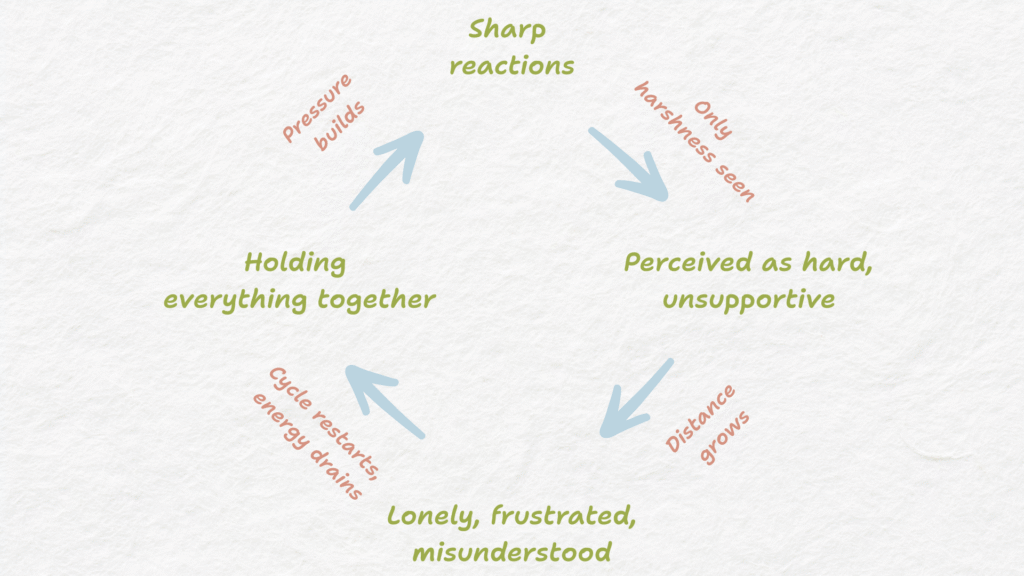They are high-performing and everybody relies on them. But sometimes they are cold or blunt. Warmth is a luxury for those who have capacity. Learn to reflect: how much of your sharpness comes from your character, and how much from depletion?
—
What it’s about
When you’ve been holding everything together for too long, you may start to seem hard, tense, or insensitive.
- People around you may even say — you’re not supportive or warm enough.
- But that isn’t necessarily your character. Often it’s a signal of chronic overload.
- If it doesn’t feel right to you, the first step toward change is realizing: the hardness and bluntness you may have started to identify with are not your “self” — they are signs of depleted capacity.
—
What’s happening
You are the one who:
- sees clearly, who pushes forward — and who makes sure everything gets done. The one who forgets nothing.
- The one who holds together the system, the kids, the projects, the house, even the relationship.
On the surface, it looks like strength. Inside, it’s tension.
- That tension sometimes erupts — as an outburst, a reproach, bluntness, or coldness.
- Usually not because you want to dominate everyone, but because there’s no space left for compassion or kindness — neither toward yourself nor toward others.
I remember this perfectly from my startup years. There were periods when we were struggling to survive. In those times, I brought some people almost to tears with my behavior. Others simply disliked me. I hate to recall it, because it clashes with my values. I detest that style of management. But at that time, it was the only way I was capable of reacting.
—
The result
- When there is no space for yourself, there is no space for warmth.
- And in the eyes of others, you may come across as distant, insensitive, or even aggressive.
- That deepens the sense of misunderstanding, emptiness, and loneliness — even among your closest ones, and sometimes brings a quiet sense of shame. Not for what you do, but for how you come across while doing it.
—
What now
- The “driver” is one of the most common types of overloaded people.
- The hardness of a driver is often not a sign of bad character, but of overload.
⠀Tip #2: Warmth is a luxury for those who have capacity.
- If people around you suggest you’re not supportive, empathetic, or warm — just read it differently. Reflect how stretched you are and try to imagine how you would be if you had capacity.
- Learn to distinguish: how much of your behavior comes from your character, and how much from depletion. When the gap between your values and your actions grows too wide, it becomes dangerous — it can lead to serious psychological difficulties.
- Do not force yourself to change overnight. Take it as an impulse for self-reflection: “How long have I been running at full tension, with no space for myself, no rest, no support?”
- Positive change begins with awareness: this is a sign of overload, not the whole of me.
—
What’s next
In the coming episodes, I’ll show you how to:
- recognize when hardness and coldness are not your nature, but overload
- start showing warmth where it matters and where it’s possible — without pretending
- create moments when you don’t have to be the one holding up the world, and gain more inner space
—
About me
I started out as a startup entrepreneur. After successfully selling my company, I became a corporate director. In the end, I left that career and turned my long-time passion into a profession: I became a full-time therapist and coach. I help high performers overcome overload and rediscover satisfaction in their lives.
—
Want more?
If this topic speaks to you, you can find the detailed extension to this episode on my website.
